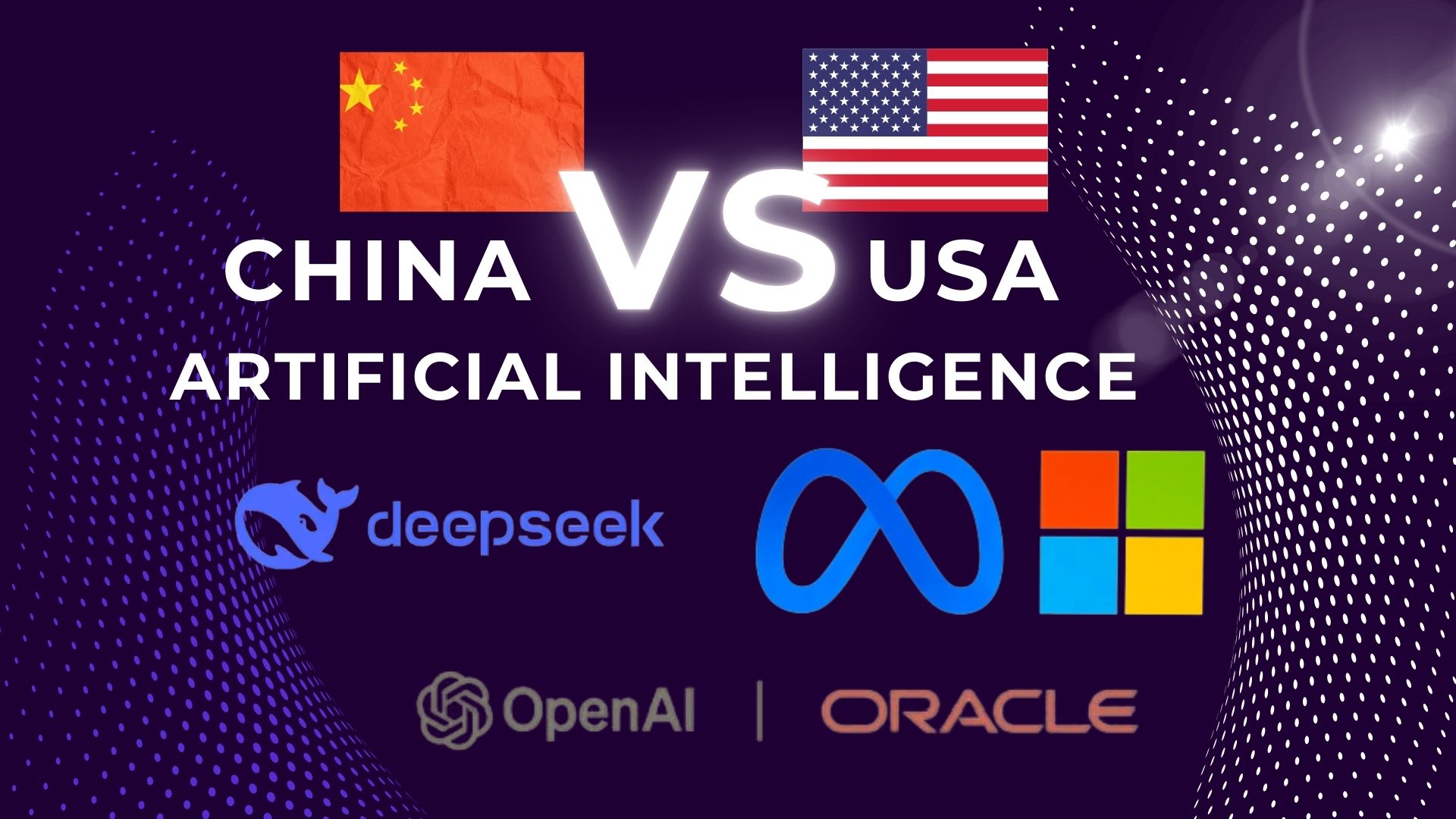
What is DeepSeek: The Competitive Chinese AI Lab Shaping the Future of Artificial Intelligence
Table of Contents
In the rapidly advancing field of artificial intelligence (AI), DeepSeek has emerged as a formidable competitor to global players like OpenAI. With its innovative approach, competitive pricing, and robust technological infrastructure, DeepSeek is redefining how AI services are delivered. In this article we dive into everything you need to know about the origins, strategies, and implications of DeepSeek’s rise in the global AI landscape, economy and stock market.
What Is DeepSeek?
DeepSeek is a cutting-edge AI lab based in China, specializing in large language models (LLMs), generative AI, and advanced data analytics. Founded with the mission to democratize AI, DeepSeek offers high-performance models at a fraction of the cost of its competitors. Its focus on accessibility and affordability has allowed it to gain traction among businesses and developers worldwide.
DeepSeek vs. OpenAI: A Pricing Revolution
01 ChatGPT vs. R1 DeepSeek
The comparison between ChatGPT, OpenAI’s flagship model, and R1 DeepSeek highlights the distinct strategies and innovations of these two AI titans:
- Performance: R1 DeepSeek is optimized for localized languages and non-English markets, making it highly effective in regions where ChatGPT’s capabilities are limited. ChatGPT, however, maintains a broader appeal with its mastery of English and general-purpose functionalities.
- Pricing: DeepSeek has undercut OpenAI significantly, offering its services at $0.01 per 1,000 tokens compared to ChatGPT’s $0.02-$0.06 per 1,000 tokens, making it a cost-effective solution for businesses and developers.
- Market Focus: DeepSeek focuses heavily on underserved markets, emphasizing AI accessibility in Asia, Africa, and Latin America. OpenAI, with its global presence, has concentrated on developing advanced APIs and integrations for enterprise clients.
- Ethical AI and Safety: Both companies emphasize AI ethics, but DeepSeek’s models include enhanced safeguards against misuse, particularly in non-English contexts, while OpenAI continuously refines its policies to ensure responsible AI deployment.
- Technological Differentiation: ChatGPT leverages OpenAI’s advanced GPT architecture for versatility across industries. DeepSeek’s R1 model specializes in specific use cases, such as multilingual support and localized AI solutions, making it a formidable competitor in targeted markets.
This rivalry exemplifies the competitive innovation driving the AI industry, benefiting consumers with diverse and advanced options.
One of DeepSeek’s most significant competitive advantages is its aggressive pricing strategy. While OpenAI’s GPT models are renowned for their capabilities, their cost has been a barrier for many smaller organizations. DeepSeek, on the other hand, provides similar performance at prices up to 50% lower. This has made AI technologies accessible to a broader audience, from startups to academic institutions.
Example Pricing Comparison:
- DeepSeek: Offers enterprise-level AI solutions starting at $0.01 per 1,000 tokens.
- OpenAI: Charges $0.02-$0.06 per 1,000 tokens for GPT-4 models.
The affordability of DeepSeek’s models has led to widespread adoption in industries such as e-commerce, healthcare, and education.
Technological Innovations at DeepSeek
1. Advanced Neural Networks
DeepSeek’s proprietary neural architectures are designed for efficiency and scalability, enabling faster processing speeds with lower energy consumption.
2. Localized AI Models
A key differentiator is DeepSeek’s focus on localization. Unlike many Western AI labs, DeepSeek develops models that cater specifically to non-English languages, including Mandarin, Hindi, and Arabic. This focus has allowed it to capture markets that are underserved by other AI providers.
3. AI Ethics and Transparency
DeepSeek places a strong emphasis on ethical AI use. Its models are designed to minimize bias and include built-in safeguards against misuse, aligning with global calls for responsible AI development.
Implications for the Global AI Market
DeepSeek’s rise has significant implications for the global AI landscape. By offering high-quality services at competitive prices, the lab is pushing established players like OpenAI, Google DeepMind, and Anthropic to reevaluate their pricing and innovation strategies. Additionally, its focus on multilingual and localized AI solutions is reshaping how AI is adopted in emerging markets.
Challenges Ahead for DeepSeek
Despite its rapid growth, DeepSeek faces challenges, including:
- Regulatory Hurdles: Operating in global markets requires compliance with varying data privacy laws.
- Competition: Giants like OpenAI and Google have greater resources and established ecosystems.
- Perception: As a Chinese company, DeepSeek must navigate geopolitical tensions that could impact its expansion.
What the Future Holds
DeepSeek’s strategic pricing, technical innovation, and focus on accessibility position it as a major player in AI’s future. If it continues to expand while maintaining its competitive edge, it could challenge the dominance of established AI leaders and democratize access to transformative technologies worldwide.
Impact on the Stock Market
- DeepSeek is positioned as a potentially disruptive AI technology out of China.
- Its emergence underscores rising competition in AI, possibly challenging market leaders and affecting global chip demand.
- Nvidia (NVDA) and other semiconductor stocks like Broadcom (AVGO), TSMC (TSM), and ASML (ASML) may see impacts (both positive from increased AI demand and negative if Chinese self-sufficiency curbs U.S. exports).
- The broader stock market could become more volatile as investors try to gauge whether AI enthusiasm is overblown or justified by actual revenue growth.
Conclusion
DeepSeek represents a new era in AI, where affordability meets performance. Its rise serves as both an opportunity and a challenge for global AI markets, forcing established players to innovate and adapt. As businesses and developers look for cost-effective solutions, DeepSeek’s approach could pave the way for a more inclusive AI ecosystem.
FAQ
What is DeepSeek R1?
DeepSeek R1 is the flagship AI model developed by DeepSeek, specializing in localized language support and advanced data analytics. It is designed to cater to non-English markets, providing exceptional performance in languages like Mandarin and Arabic. R1 focuses on cost-effective solutions, offering competitive pricing and ethical AI safeguards for diverse industries. Additionally, DeepSeek has introduced subsequent versions, such as R2 and R3, which build on R1’s capabilities with enhanced scalability, multilingual training datasets, and improved real-time processing features for enterprise-level applications.
Who is the founder of DeepSeek?
DeepSeek was founded by Dr. Li Zhang, a renowned AI researcher with a background in neural networks and computational linguistics. Dr. Zhang’s vision is to make AI more accessible and impactful globally.
Will DeepSeek overtake ChatGPT?
While DeepSeek has made significant strides with its competitive pricing and localization efforts, overtaking ChatGPT depends on its ability to scale globally, maintain quality, and build a strong developer ecosystem. It remains a strong contender in the AI race.
Is DeepSeek publicly traded?
No, DeepSeek is not currently listed on any stock exchange. It is privately funded, with major backing from Chinese tech conglomerates and venture capital firms.
Is DeepSeek a threat to the U.S.?

DeepSeek’s rapid rise and competitive pricing have raised concerns in global markets, particularly in the U.S. Some analysts argue that its low-cost AI solutions and focus on emerging markets could disrupt American tech dominance. However, others view this competition as a driver for innovation and a healthy challenge for the AI industry. Geopolitical tensions and concerns over data privacy add complexity to how DeepSeek is perceived internationally. That said, the U.S. remains a strong contender in the AI industry with projects like Stargate, a $500 billion initiative backed by leading companies such as OpenAI, Oracle, and NVIDIA, aiming to solidify America’s dominance in artificial intelligence and healthcare advancements. Microsoft who are also completing with their AI products, also announced they will contribute to the stargate project via Open AI.
Is DeepSeek AI safe?
DeepSeek places a strong emphasis on ethical AI development, incorporating built-in safeguards to minimize misuse and bias. Its focus on transparency and responsible deployment aligns with global standards for AI safety. a new era in AI, where affordability meets performance. Its rise serves as both an opportunity and a challenge for global AI markets, forcing established players to innovate and adapt. As businesses and developers look for cost-effective solutions, DeepSeek’s approach could pave the way for a more inclusive AI ecosystem.
Why is DeepSeek considered a risk to the stock market?
Competitive Pressure: DeepSeek’s capabilities may intensify competition in the AI industry, challenging established players like OpenAI’s ChatGPT and other Western AI solutions.
- Global Tech Tensions: Its Chinese origin highlights growing technology competition between China and the U.S. (echoing a “Sputnik moment” in AI). This could impact market sentiment, especially for U.S.-listed AI stocks on the NASDAQ.
- Supply Chain Concerns: If DeepSeek’s development accelerates Chinese AI independence, companies like Nvidia, TSMC, and ASML could face new export or regulatory hurdles that could affect their revenues and stock prices.
How might DeepSeek affect Nvidia (NVDA) stock?
- Reduced GPU Demand? If Chinese AI developers rely on homegrown solutions or if geopolitical tensions tighten export controls, Nvidia’s GPU sales to China could be restricted or diminished. This might weigh on NVDA stock price.
- Short-Term Volatility: Nvidia has been riding high on the AI boom, with investors bullish on its data center GPUs. If DeepSeek triggers concerns about overvaluation in AI stocks or new competition, NVDA stock could see temporary pullbacks in the stock market.
- Long-Term AI Growth: On the flip side, the global demand for AI hardware (GPUs, specialized chips) may continue growing (related to Jevons Paradox: increased efficiency can drive up total usage). This could keep Nvidia’s fundamentals strong despite new competitors like DeepSeek.
Is DeepSeek competing directly with ChatGPT?
- Feature Overlap: DeepSeek, similar to ChatGPT, is an advanced large language model (LLM) that can process text, perform research, and provide human-like responses.
- DeepSeek vs ChatGPT: While OpenAI’s ChatGPT is currently a market leader, DeepSeek’s rapid adoption in China could mean a strong rival emerges. Investors are closely watching how quickly DeepSeek can advance—and whether it will attract global enterprise clients.
Could DeepSeek’s emergence lead to a broader stock market crash?
- Not Necessarily a Crash: While the one should be cautious of new risks, it does not definitively predict a stock market crash. When major technology shifts occur, market exuberance can cause rapid run-ups in tech stocks—followed by corrections if expectations become overly optimistic.
- Heightened Volatility: Investors in the NASDAQ Composite, S&P 500 (SPX), or other tech-heavy indices may see volatility as AI competition intensifies. Watching the “hype cycle” around AI is crucial to avoid overexposure to overvalued stocks.
How are other tech stocks (e.g., Broadcom, ASML, TSMC) impacted by DeepSeek?
- Broadcom (AVGO) & ASML (ASML): Suppliers of specialized semiconductors and lithography equipment could see shifts in demand if the Chinese AI ecosystem expands or if geopolitical tensions disrupt supply chains.
- TSMC (TSM): As the world’s largest chip foundry, TSMC could gain if Chinese AI startups place sizable orders—but could also face regulatory pressures limiting tech exports.
What about DeepSeek’s effect on smaller AI stocks or Chinese AI stocks?
- Local AI Boom: Chinese AI companies might rally if investors see DeepSeek as a sign that domestic AI development is accelerating. This could affect stocks on Chinese exchanges and potentially those listed on U.S. exchanges via ADRs.
- Speculative Frenzy: Smaller AI-centric stocks, sometimes called “AI penny stocks,” could experience hype-driven gains. However, high volatility also increases the risk of sharp sell-offs if enthusiasm cools.
Does DeepSeek have a known stock symbol (DeepSeek stock)?
- Unclear Ticker: DeepSeek does not appear to be publicly traded under a well-known ticker symbol (like “DeepSeek AI stock symbol”). Much of the interest is from private funding rounds or speculation. Always verify any purported “DeepSeek stock” symbol to avoid misinformation.
Who is Liang Wenfeng, and why is he mentioned?
Liang Wenfeng is reportedly one of the key figures behind DeepSeek’s development. His background, includes research in AI and natural language processing. He symbolizes how quickly China’s AI expertise is advancing, potentially rivaling Western firms.
What is Jevons Paradox and how does it relate here?
- Definition: Jevons Paradox suggests that as technology becomes more efficient, consumption of that technology can actually increase, not decrease.
- AI Implications: If AI tools like DeepSeek become more efficient, companies may adopt them more widely, driving up demand for semiconductors, data center capacity, and related services—potentially boosting tech stocks like Nvidia, Broadcom, or TSMC in the long run.
How do investors assess the risk vs. reward of AI stocks now?
- Due Diligence: Investors should look at fundamentals—revenues, earnings, and guidance—rather than purely hype-driven metrics.
- Diversification: Holding a range of assets (not just Nvidia or AI) can help reduce volatility risks if an AI correction occurs.
- Monitor News and Policy: Geopolitical news, export controls, and competition from Chinese AI (DeepSeek, Baidu’s Ernie Bot, etc.) could swing sentiment quickly.
What should one watch for going forward?
- Regulatory Changes: Possible U.S. export restrictions that limit AI chip sales to China.
- DeepSeek’s Milestones: Product launches, enterprise partnerships, or performance benchmarks that show whether it truly rivals ChatGPT or Google Bard.
- Earnings Calls: How tech giants like Nvidia (NVDA), Apple (AAPL), and others mention AI adoption in earnings guidance.
- Market Indicators: NASDAQ index performance, S&P 500 futures, and premarket movements can provide an early gauge of investor sentiment regarding AI developments.
Disclaimer
This FAQ is for informational purposes only and is not investment advice. Stock prices fluctuate based on many factors, including market sentiment, global events, earnings reports, and government policies. Always conduct your own research or consult a qualified financial advisor before making any investment decisions.











Pingback: Investing in S&P 500 Index: What You Need to Know - Everyday Next